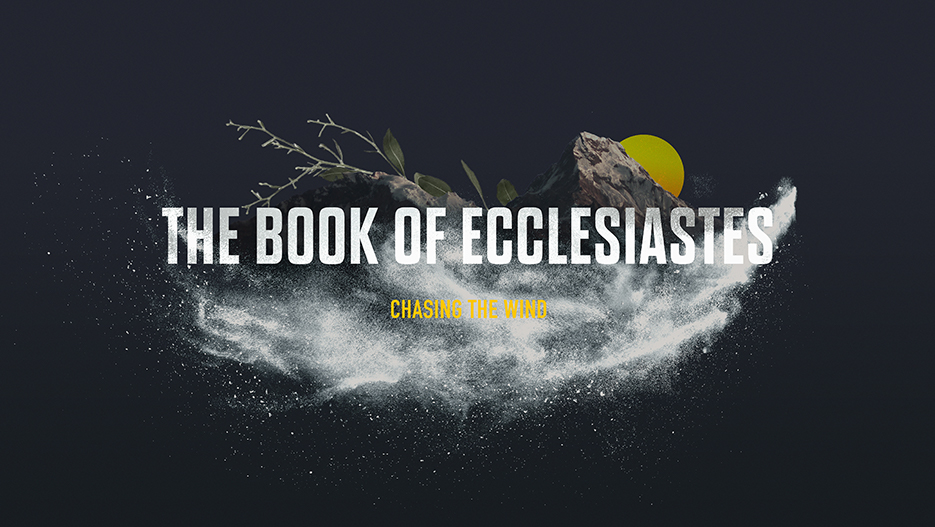This week will continue our Lenten study of Ecclesiastes. Please read Chapter 2 for this Tuesday. The first section of chapter 2 (vv.1-14a) is concerned with this question: If wisdom and folly are both havel, and particularly if wisdom brings vexation and sorrow (1:18), why pursue wisdom? This is a very similar question that must be asked of Christians: If we are saved by unmerited grace, why be good? If neither wisdom nor righteousness has any eternal meaning or consequence beyond the present, why pursue wisdom or righteousness? In his actions and observations, the Speaker realizes that, even in the few days we have in our life, wisdom is superior to folly, as light is superior to darkness. 2:13. This is the Speaker’s personal observation and conclusion. The question, however, remains open for us. Why be good? Why be wise? Why go to church on Sunday?
However, in the second part of Chapter 2 (vv.14b-26), the Speaker despairs because, although wisdom is better than folly, the same fate meets both the wise man and the fool. Death’s unfairness in leveling both the wise man and fool becomes too much for the Speaker to handle. v.16. In this section, the other reason for despair is that the Speaker has worked hard to amass wealth, and yet, he does not have the time to enjoy the fruit of his labor. Rather, his successor who did not work as he did and who may be a complete fool with enjoy this benefit. v.18. As the sayings goes: you can’t take it with you and shirtsleeves to shirtsleeves in three generations. In this despair, he hates his life and he hates his work. vv.17, 18.
The Speaker’s despair raises this issue for us. If all things are havel, then why not despair and despise life? In his essay, The Myth of Sisyphus (1942), Albert Camus addresses this issue very directly and asks the question of whether our futile search for meaning in the face of an unintelligible world requires suicide. The hero of his essay is Sisyphus, the king of Corinth who was condemned by the gods by having to repeatedly roll a large stone up a hill only to have it roll back down again as soon as the task was completed. Sisyphus is the very epitome of meaningless labor and existence. Camus imagines, however, that Sisyphus comes to acknowledge and embrace the absurdity and meaninglessness of his task. And in this acceptance and awareness, Sisyphus can find peace and happiness in his existence. For Camus, our recognition of living in an absurd existence allows us to live life to its fullest because it allows us to live fully in the present. The Speaker reaches a similar conclusion in verses 24-25 (and later in 9:9and 11:7).
This chapter raises several questions for us. First, is life mere vanity and a chasing after the wind? Is there any deeper meaning or significance to what you do beyond death? If the same fate befalls everyone, then why be good? We can affirm that amassing wealth or what happens in the NCAA Tournament is ultimately meaningless, but can we make this same affirmation on things closer to our hearts? Are our personal and familial relationships vanity? Is the church vanity? Is your faith vanity?
Second, what is your reaction to the absurdity and non-rationality of life? We can have a despondent acceptance of the absurdity where life becomes hated and despised. We can seek to escape the unreasonableness of the world by fashioning an afterlife, like the Divine Comedy, where all receive their just rewards based upon our actions or our acceptance of certain metaphysical propositions. Like Sisyphus, we can find happiness in an embrace of the absurdity of life. Knowing life is meaningless, spares us from seeking any meaning. A similar avenue is simply to live in the present. Last Easter when we read through Dr. Albert Rossi’s book Becoming a Healing Presence, one of his overarching themes was the necessity of us living in the present. If we simply live in the present, the question of any eternal meaning doesn’t exist. What is your reaction?
Finally, the question that we must always ask ourselves as we read through the Scriptures, is where do we find Jesus within this discussion? The Speaker seeks meaning and happiness within himself, his work, his possessions, and his hope for a reward for his faith and wisdom. Are Jesus’ teachings about hating your own life (Luke 14:26), or storing up treasure (Matt 6:19), or worrying about tomorrow (Matt 6:27) relevant to the Speaker’s teaching? Where else or how else do we find Jesus in chapter 2?
Dinner is at 6. The menu is St. Patrick’s Day (observed). Discussion about 6:45. Hope to see you here.
I leave Sisyphus at the foot of the mountain! One always finds one’s burden again. But Sisyphus teaches the higher fidelity that negates the gods and raises rocks. He too concludes that all is well. This universe henceforth without a master seems to him neither sterile nor futile. Each atom of that stone, each mineral flake of that night filled mountain, in itself forms a world. The struggle itself toward the heights is enough to fill a man’s heart. One must imagine Sisyphus happy.
Albert Camus

